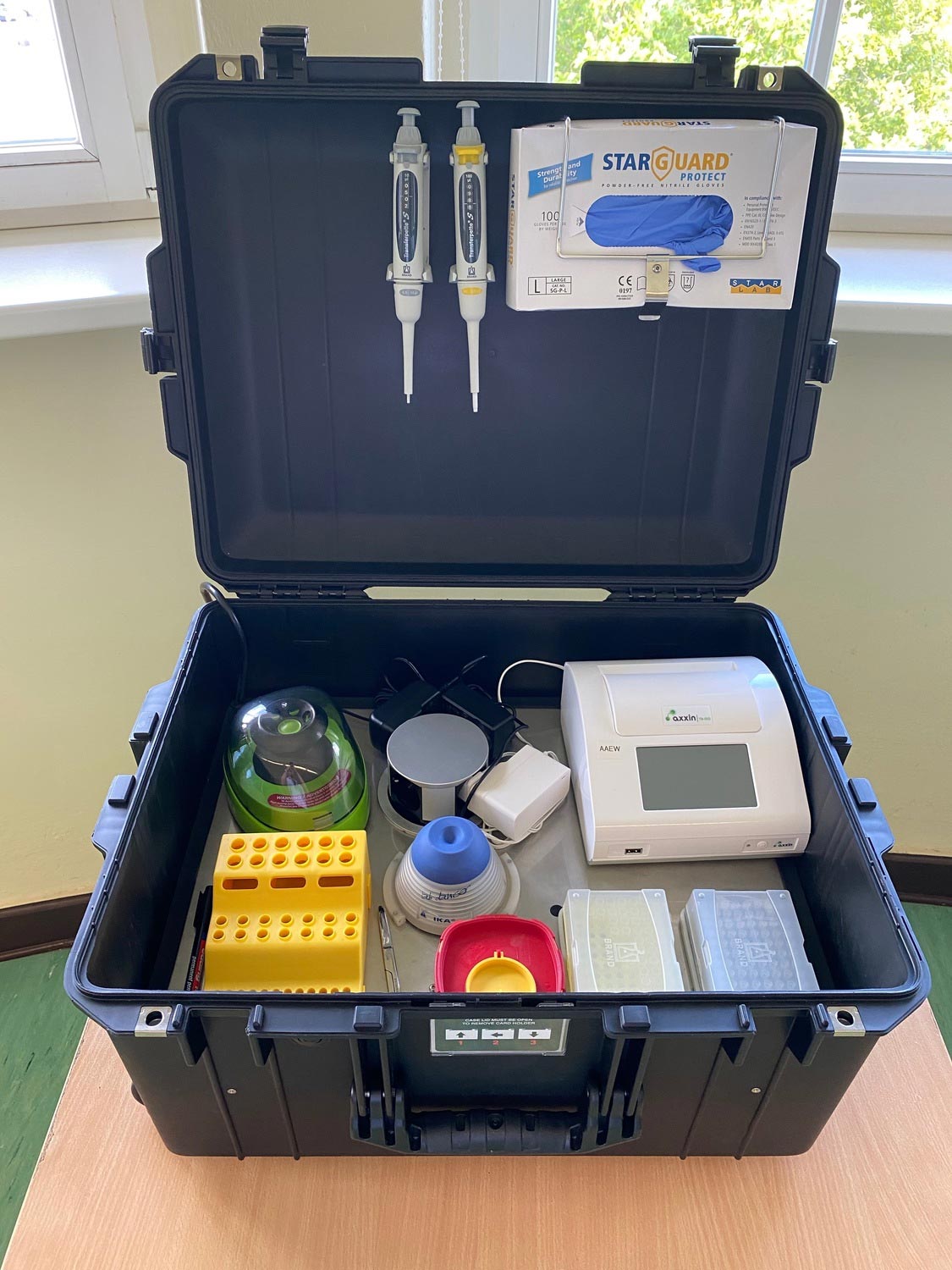Rapid COVID-19 Testing From a Suitcase
0 View
Share this Video
- Publish Date:
- 16 May, 2021
- Category:
- Covid
- Video License
- Standard License
- Imported From:
- Youtube
Tags

The suitcase laboratory has already been used successfully for other infectious diseases in Africa. Credit: Dr. Ahmed Abd El Wahed
Mobile laboratory for rapid detection of SARS-CoV-2 for Africa.
The PCR test is the most accurate tool to identify SARS-CoV-2. However, valid results are often not available for days. In addition, the laboratory must be well equipped, have trained personnel and sufficient financial resources. All of this is usually a problem in Africa. A portable suitcase could help. In collaboration with several African universities, scientists at the University of Leipzig have discovered that this mini-lab produces test results that are almost as good as a PCR test – and almost in real time. The researchers have now published their findings in the journal Analytical Chemistry.
The compact housing could provide fast coronavirus test results in regions of Africa where testing facilities and medical infrastructure fall far short of European standards. The case is a small, mobile laboratory equipped with a diagnostic device, solar energy, various reagents, some reference RNA extracts and rubber gloves. “With this tool, a so-called RPA test can be performed directly on site, even in the most remote areas. It only takes 15 minutes to get a result, ”says virologist Dr. Ahmed Abd El Wahed of the Institute for Animal Hygiene and Veterinary Public Health, who leads the study at the University of Leipzig.
Infected people can be identified and isolated more quickly. This is an important and life-saving measure in countries that may have to wait long for vaccines and will help control the COVID-19 pandemic. In the first study at the University of Leipzig, genome analysis (RPA method, recombinase polymerase amplification) was used to detect infection with SARS-CoV-2 in near real time, with an accuracy of 94 percent. Dr. Abd El Wahed explained the simplicity of the mobile lab: “A saliva sample or nasal swab is sufficient for the test and all reagents can be used at room temperature.”
Suitcase lab is already a success against Ebola
The method that will now be used to conduct coronavirus testing has already been successfully evaluated for several other infectious diseases, for example in Guinea in 2015 during the Ebola outbreak in West Africa. For COVID-19 diagnosis, the mobile suitcase lab has already been implemented in Egypt, Ghana and Senegal, as well as five other African countries: the Democratic Republic of the Congo, Madagascar, Nigeria, Sudan and Uganda. Results will now be evaluated in further studies.
In particular, the exact performance of the developed SARS-CoV-2 RPA assays will be determined and compared with PCR assays. If the results are similar, as the preliminary data seems to suggest, the suitcase laboratory could soon be increasingly used in the clinical field to determine SARS-CoV-2.
Reference: “Suitcase Lab for Rapid Detection of SARS-CoV-2 Based on Recombinase Polymerase Amplification Assay” by Ahmed Abd El Wahed, Pranav Patel, Melanie Maier, Corinna Pietsch, Dana Rüster, Susanne Böhlken-Fascher, Jonas Kissenkötter, Ole Behrmann, Michael Frimpong, Moussa Moïse Diagne, Martin Faye, Ndongo Dia, Mohamed A. Shalaby, Haitham Amer, Mahmoud Elgamal, Ali Zaki, Ghada Ismail, Marco Kaiser, Victor M. Corman, Matthias Niederig, Olfert Landt, Ousmane Faye, Amadou A. Sall, Frank T. Hufert, Uwe Truyen, Uwe G. Liebert and Manfred Weidmann, January 20, 2021, Analytical Chemistry.
DOI: 10.1021 / acs.analchem.0c04779
The study will receive 500,000 euros in funding from the European and Developing Countries Clinical Trials Partnership (EDCTP) and will run until September 2021. The EDCTP, funded by the European Union, is a public partnership between countries in Europe and sub-Saharan Africa. It aims to accelerate the clinical development of new or improved drugs for the identification, treatment and prevention of poverty-related infectious diseases.










